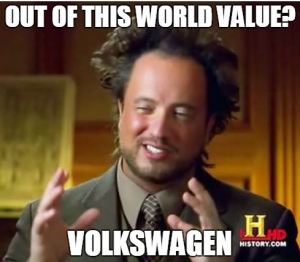
When I was in highschool, one of the most controversial topics of conversation was who your eight best friends on Myspace were. I was one of many girls who used a Supre tote as a school bag and had a punk phase where I wore studded belt outside of my belt loops to look more like Avril Lavigne.
Just like teenagers, industries are influenced by trends and shifts in popularity. The big one for marketing right now is ‘brand authenticity’. According to Weischer et al, “The roots of the concept of authenticity lie in an aphorism derived from Greek philosophy and expounded by Shakespeare’s Polonius: ‘To thine own self be true’ (2013).
While Shakespeare did sum this up succinctly, it is certainly much easier to be true to yourself when you are the only arbitrator of your identity. When that influence comes from a governing body and multiple stakeholders, the concept of what ‘self’ is gets complicated. This problem is faced by many companies, especially in the world of social media, as they try to establish their own ‘brand authenticity’ through some form of advertising of their corporate social responsibility strategy (CSR).
For those unfamiliar with the term, McWilliams et al define CSR as “situations where the firm goes beyond compliance and engages in ‘actions that appear to further some social good, beyond the interests of the firm and that which is required by law’” (2006, 1). This push for social good is one of the main tools used by companies in their online marketing when they are trying to establish their brand as authentic.
This focus on using authentic products is a consumer’s way of re-estabilishing their identity and finding meaning in the many crises the world has faced recently. According to experts, like Fritz et al, it’s a “reaction to the growing number of serious crises over the past years, such as the financial crisis, current threats to society such as climate change…or simply progressing globalization which increasingly separates people from their national identities” (Fritz et al 2017).
In marketing, we often use authenticity to differentiate between “staged” and “true” storytelling in a company’s advertisements (Fritz et al 2013). A storytelling or advertising approach is considered truthful if we believe the company will also “act in accordance with deep personal values and convictions” (Fritz et al 2013).
The key word here is ‘act’; a company should not be using it’s advertising strategy as its main avenue of corporate responsibility. It should instead be using it to demonstrate the actions they are taking through the development of other policies.
Authenticity case study: Volkswagen
 Prior to 2015, Volkswagen had successfully developed an authentic platform for their brand, focusing their advertising on their sustainability policies and low-emissions vehicles. This perception of them as a sustainable ended in 2015 when the United States Environmental Protection Agency (EPA) found that they had been violating the Clean Air by fabricating emissions results.
Prior to 2015, Volkswagen had successfully developed an authentic platform for their brand, focusing their advertising on their sustainability policies and low-emissions vehicles. This perception of them as a sustainable ended in 2015 when the United States Environmental Protection Agency (EPA) found that they had been violating the Clean Air by fabricating emissions results.
More damaging still, was a memo which was made public in 2016, showing that Volkswagen were aware they were in violation prior to the 2015 scandal (Valentini and Kruckeberg 2018).
Suffering many financial damages as a result of the bad publicity, the company also became the target of many memes. Many of the memes satired the brand, showcasing them as being disengenuous as they were not acting with the same conviction represented in their advertising.
One such example of this misalignment is the Volkswagen Jetta, which won the 2009 Green Car of the Year. It was also one the cars involved in the US emissions scandal (Valentini and Kruckeberg 2018).
Why it all went wrong
Volkswagen’s agenda to develop a sustainable manufacturing company was ambitious and was always going to come with challenges. One of the most difficult challenges to manage would have been the higher expenses involved;
“corporate green agendas have come with costs, especially for those corporations in which environmentally sustainable practices require substantial organizational changes, for example, those industries involved in non-renewable energy, chemical production and automobile manufacturing” (Valentini and Kruckeberg 2018).
Volkswagen are one of many car manufacturing companies who have encountered rising risks as the expectations of their stakeholders have changed; “because cars’ fuel efficiency is related to CO2 emissions, carmakers have experienced risk from escalating oil prices, together with government regulations of CO2 emissions” (Valentini and Kruckeberg 2018).
These social demands resulted in Volkswagen shakeholders pushing for more sustainable practises, with the emissions scandal occuring in the same year as the Paris Climate Accord; the first treaty to commit (almost) every country to reducing carbon emissions. According to Velentini and Kruckberg,it’s important to integrate stakeholder expectations into corporate objectives as it helps a company stay relevant and respond to social demands (2018). Volkswagen would have therefore felt a lot of pressure to include sustainable practises in their advertising in response.
Authentic advertising has become an important avenue for companies to both respond to stakeholders and to offset some of the risks associated with sustainable practises by increasing consumer spending. Many companies have needed to find new ways to “overcome the recent financial crisis that has affected the automobile industry, causing a drop in demand”, something that has occurred alongside technological developments in fuel and energy conservation (Valentini and Kruckeberg 2018).
Volkswagen was one of many who attempted to address these social demands in their advertising. While this was successful for a short time, it ultimately failed as they were not also addressing them in their CSR. This resulted in the actions of the engineering department not aligning with the message delivered by marketing. Not surprisingly, after pleading guilty to criminal charges in 2017, Volkswagen dropped their slogan, “Truth in Engineering”, (Valentini and Kruckeberg 2018).
The long-term damage
 A company’s reputation, according to Valentini and Kruckeberg, “is not a stable asset that fully protects an organization from any storm” (2018). While Volkswagen’s reputation has seen it bounce-back faster than expected, they have not been able to match their pre-crisis growth. Ultimately; “the case shows that Volkswagen was caught not ‘walking the talk’, because its CS promise in its product was not tenable” (Valentini and Kruckeberg 2018). This lack of CSR authenticity [1] exhibited by Volkswagen has ultimately impacted their bottom line.
A company’s reputation, according to Valentini and Kruckeberg, “is not a stable asset that fully protects an organization from any storm” (2018). While Volkswagen’s reputation has seen it bounce-back faster than expected, they have not been able to match their pre-crisis growth. Ultimately; “the case shows that Volkswagen was caught not ‘walking the talk’, because its CS promise in its product was not tenable” (Valentini and Kruckeberg 2018). This lack of CSR authenticity [1] exhibited by Volkswagen has ultimately impacted their bottom line.
With all that being said, time out of the headlines has helped Volkswagen recover; “Our research shows that organisations which invest in building reputation experience less damage and recover more quickly following a crisis than organisations which do not,” (Mortimer and Faull 2017). This is despite losing a recent appeal against the UK’s largest group action, consisting of more than 90,000 motorists (Hull 2020).
Whether or not Volkswagen will ever truly be able to move on from the damage done in 2015 and recover their CSR authenticity is yet to be seen.
Footnotes
[1] CSR authenticity refers to a consumer beliefs that “the company’s CSR activities are not a part of the pursuit of corporate profits, but rather a genuine act of consideration and concern for various stakeholders” (Kim and Lee 2019).
References
Financial Times. 2016. “Volkswagen Faces $15Bn Hit Over US Green Ad Campaign”. Financial times. https://www.ft.com/content/1234f9be-f5bf-11e5-9afe-dd2472ea263d.
Fritz, Kristine et al. 2017. Authenticity in branding – exploring antecedents and consequences of brand authenticity. European Journal of Marketing 51, (2): 324-348, http://dbgw.lis.curtin.edu.au:2048/login?url=https://search-proquest-com.dbgw.lis.curtin.edu.au/docview/1862664376?accountid=10382 (accessed August 2, 2020).
Kim, Songmi and Heejung Lee. 2019. “The Effect of CSR Fit and CSR Authenticity on the Brand Attitude”. Sustainability 12.
McWilliams, et al. 2006. “Guest Editors’ Introduction – Corporate Social Responsibility: Strategic Implications*”. Journal of Management Studies 43:1.
Mortimer, Natalie and Jennifer Faull. 2017. “Volkswagen’s Crowning Of World’s Top Car Maker A Triumph For Crisis PR Strategy “. The Drum. https://www.thedrum.com/news/2017/02/02/volkswagens-crowning-worlds-top-car-maker-triumph-crisis-pr-strategy.
Valentini, Chiara and Dean Kruckeberg.“Walking the environmental responsibility talk” in the automobile industry: An ethics case study of the Volkswagen environmental scandal”. Corporate communications, 2018-10, Vol.23 (4), p.528-543.
Weischer, Anna Elisabeth et al.“To thine own self be true’: The effects of enactment and life storytelling on perceived leader authenticity.” The Leadership Quarterly,Volume 24, Issue 4, 2013,Pages 477-495.
